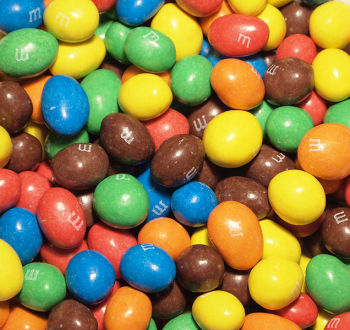Are "flavorists" or "food scientist" creating false foods?
 Tuesday, October 2, 2012 at 09:42PM
Tuesday, October 2, 2012 at 09:42PM  Image: Tiia MontoCan you resist these M&Ms? If so, you may be at least partly Paleo. Many in our modern world are pulled by this and similar “foods.” Why? First let’s consider the strength of the drive leading some to consume the contents of this package. David A. Kessler, MD, former FDA commissioner writes In The End of Overeating:
Image: Tiia MontoCan you resist these M&Ms? If so, you may be at least partly Paleo. Many in our modern world are pulled by this and similar “foods.” Why? First let’s consider the strength of the drive leading some to consume the contents of this package. David A. Kessler, MD, former FDA commissioner writes In The End of Overeating:
My conversation with a journalist, a forty-year-old man I’ll call Andrew, reminded me that the struggle respects neither gender, nor socioeconomic class, nor age. Andrew, who is about five feet nine inches tall and weighs about 245 pounds, has written fearlessly from many of the world’s battlegrounds. He has spent time with jihadists, suicide bombers, and war-hardened soldiers, and he hasn’t flinched. But when I placed M&M’s on the table before him, Andrew felt barely able to cope.
Andrew reflects:
“I wake up in the morning knowing that food is my enemy and that I am my own enemy. It’s uncontrollable.”
In a recent story in "CBS This Morning: Saturday" psychologist Daniel Amen, argues that modern food manipulation is in the hands of "flavorists." They often design processed foods to stimulate our cravings:
"They know how to put together certain combinations of fat, sugar and salt to actually work on the heroin or morphine centers of your brain and they can be totally addictive if you are not careful."
“To battle these cravings, Amen suggests getting at least seven hours of sleep to avoid making bad food decisions; start the day with a breakfast with protein to help balance your blood sugar through the day; and avoid sugar and artificial sweeteners.”
(Sounds Paleo doesn’t it?)
However, what Amen calls "flavorists," Kessler calls "food scientists." In his book, Kessler describes how processed food is often designed to trigger the reward centers in the brain. Quoting an industry “insider,” the fast food industry is “the manipulator of the consumers’ minds and desires.”
Now, what if you block the chemical hook and leave the flavor unchanged? In a study mentioned by Kessler animals ate less chocolate following treatment with naltrexone, an opioid antagonist. “Presumably because blocking the opioid signals took away the reward value.” Thus, there is science to processed food design. Science that may make processed food better, but also science to make processed food “hedonistic.”
OK, so the fast food industry designs food to stimulate the brain’s reward centers; the greater the reward, the more we consume and purchase. Is this a satisfying answer? Why do the strong cravings overrule the conscious mind, such as in Andrew’s case, even though it is aware these foods eventually undermine our health? Amen’s suggests designer foods stimulate the same regions of our brains associated with yearning for family or friends. Discussing this with my son John Michael, he wondered if we are replacing a loss:
It is almost as though junk food is taking the place of community.
 Daniel Amen,
Daniel Amen,  David Kessler,
David Kessler,  flavorists,
flavorists,  food scientist,
food scientist,  junk food,
junk food,  opioid,
opioid,  pprocessed food in
pprocessed food in  Nutrition,
Nutrition,  Obesity
Obesity 
